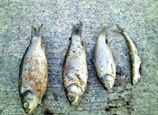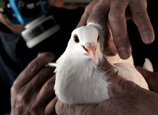
Chinese officials expressed confidence in curbing the H7N9 strain of bird flu, citing how the country has built capacity to deal with epidemics since the SARS outbreak.
However, the possibility of the virus being transmitted between humans cannot be ruled out, a World Health Organization official said.
Michael O'Leary, the WHO's China representative, said such a possibility remains despite no one in close contact with the first human H7N9 cases having tested positive for the strain.
He made the remarks at a press conference with China's National Health and Family Planning Commission on Monday.
With three more cases reported on Monday, China has recorded 24 human cases of H7N9, seven of them fatal.
The three cases reported on Monday were in Shanghai and Jiangsu province.
A 4-year-old boy in Shanghai who on Thursday was confirmed infected with H7N9 has recovered, showing that not all human infections are critical.
Liang Wannian, a senior official at the National Health and Family Planning Commission, discusses prevention and control measures for H7N9 bird flu at a news conference on Monday. Zou Hong / China Daily
"At this time, there is no evidence of sustained human-to-human transmission of the virus, but no one can predict the future," O'Leary acknowledged, since influenza viruses can mutate.
He stressed the importance of keeping close surveillance of the viral activity.
If the virus mutates to spread among humans, a pandemic could follow, epidemiologists warned.
Liang Wannian, director of the health emergency response office under the National Health and Family Planning Commission, said, "We are closely monitoring the situation and have expanded virus tracking into more areas in the country."
Since the SARS epidemic in 2003, China has set up a nationwide surveillance network comprising more than 500 hospitals and 400 labs.
Mandatory reporting of unexplained pneumonia cases by health authorities has helped track the H7N9 virus.
Liang indicated that the virus might spread outside Shanghai and Zhejiang, Jiangsu and Anhui provinces.
Shu Yuelong, director of the Chinese National Influenza Center, said that H7N9, compared with the H5N1 strain of bird flu, was more likely to infect humans.
But further information about the virus - how it is transmitted, potential animal hosts and how easily it can spread - remains limited, he said.
Liang is confident the virus can be contained, citing strengthened virus surveillance and enhanced medical capacity in early detection and treatment of the disease.
He said health authorities issued a directive prohibiting hospitals from denying or delaying treatment of patients for financial reasons.
For other parts of the world, particularly neighboring countries, O'Leary urged H7N9 testing of serious and unexplained influenza cases.
"But so far it's only in a small number of provinces in China," he said.
The virus appears to spread mainly from birds to humans in a sporadic way, he said.
Feng Zijian, director of the health emergency center of the Chinese Center for Disease Control and Prevention, said avoiding contact with live poultry substantially lowered the risks of infection.
Liang said vaccination is not necessary at the moment.
But "we have initiated preparations for vaccine development", he added.
Previously, there was speculation that dead pigs in the Huangpu River might be related to the new strain of virus.
O'Leary dismissed that.
"We have not connected the pig deaths to human cases of influenza, as those pigs had tested negative for influenza viruses," he said.
But surveillance is under way.
Sirenda Vong, medical officer in emerging diseases, surveillance and response for the WHO China Office, said that China had also been tracing the virus among mammals, particularly pigs.
The evidence so far points to poultry and birds as the main vehicle of H7N9 transmission, but other sources of infection like mammals cannot be excluded, he explained.
"The epidemic is still ongoing and we cannot exclude all the potentials of infections to and from mammals," he said.
















 Life aboard a fishing boat under bridge in city of Chongqing
Life aboard a fishing boat under bridge in city of Chongqing


![]()
